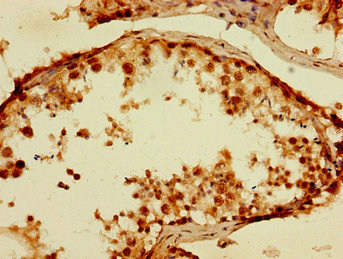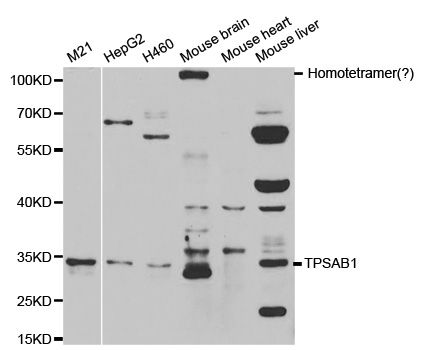![Tryptase (Mast Cell Marker)(TPSAB1/1963), CF405S conjugate, 0.1mg/mL [26628-22-8] Tryptase (Mast Cell Marker)(TPSAB1/1963), CF405S conjugate, 0.1mg/mL [26628-22-8]](https://biotium.com/wp-content/uploads/2021/02/view_image-891.jpeg)
Tryptase (Mast Cell Marker)(TPSAB1/1963), CF405S conjugate, 0.1mg/mL [26628-22-8]
BNC041963
ApplicationsImmunoHistoChemistry, ImmunoHistoChemistry Paraffin
Product group Antibodies
ReactivityBovine, Human, Mouse
TargetTPSAB1
Overview
- SupplierBiotium
- Product NameTryptase (Mast Cell Marker)(TPSAB1/1963), CF405S conjugate, 0.1mg/mL [26628-22-8]
- Delivery Days Customer9
- ApplicationsImmunoHistoChemistry, ImmunoHistoChemistry Paraffin
- CAS Number26628-22-8
- CertificationResearch Use Only
- ClonalityMonoclonal
- Clone IDTPSAB1/1963
- Concentration0.1 mg/ml
- ConjugateOther Conjugate
- Gene ID7177
- Target nameTPSAB1
- Target descriptiontryptase alpha/beta 1
- Target synonymsTPS1, TPS2, TPSB1, TPSB2, Tryptase-2, tryptase alpha/beta-1, Tryptase II, Tryptase beta-2, epididymis secretory sperm binding protein, mast cell alpha II tryptase, mast cell beta I tryptase, mast cell tryptase, tryptase alpha II, tryptase alpha-1, tryptase beta I, tryptase beta-1, tryptase-1, tryptase-I, tryptase-III
- HostMouse
- IsotypeIgG1
- Protein IDQ15661
- Protein NameTryptase alpha/beta-1
- Scientific DescriptionTryptases comprise a family of trypsin-like serine proteases (peptidase family S1). Tryptases are stored in mast cell secretory granules and basophils. Mast cells are connective tissue cells derived from blood-forming tissues that line arterial walls and secrete substances, which mediate inflammatory and immune responses. Tryptases are released into the extracellular environment and are resistant to all known endogenous proteinase inhibitors. This antibody reacts with mast cells distributed in skin, synovium, lung, and heart. This antibody does not bind with any other cell type. Human mast cell tryptase is considered to be an important marker of mast cell activation and is an important mediator of inflammation. Mastocytosis is a term collectively used for a group of disorders in which there is abnormal accumulation of mast cells in one or multiple organs. Anti-tryptase, combined with anti-CD2, anti-CD25, and anti-CD117, can be useful in identifying reactive mast cell hyperplasia, myelogenous neoplasms, mast cell leukemia, and mastocytosis. Primary antibodies are available purified, or with a selection of fluorescent CF® Dyes and other labels. CF® Dyes offer exceptional brightness and photostability. Note: Conjugates of blue fluorescent dyes like CF®405S and CF®405M are not recommended for detecting low abundance targets, because blue dyes have lower fluorescence and can give higher non-specific background than other dye colors.
- SourceAnimal
- ReactivityBovine, Human, Mouse
- Storage Instruction2°C to 8°C,RT
- UNSPSC41116161







